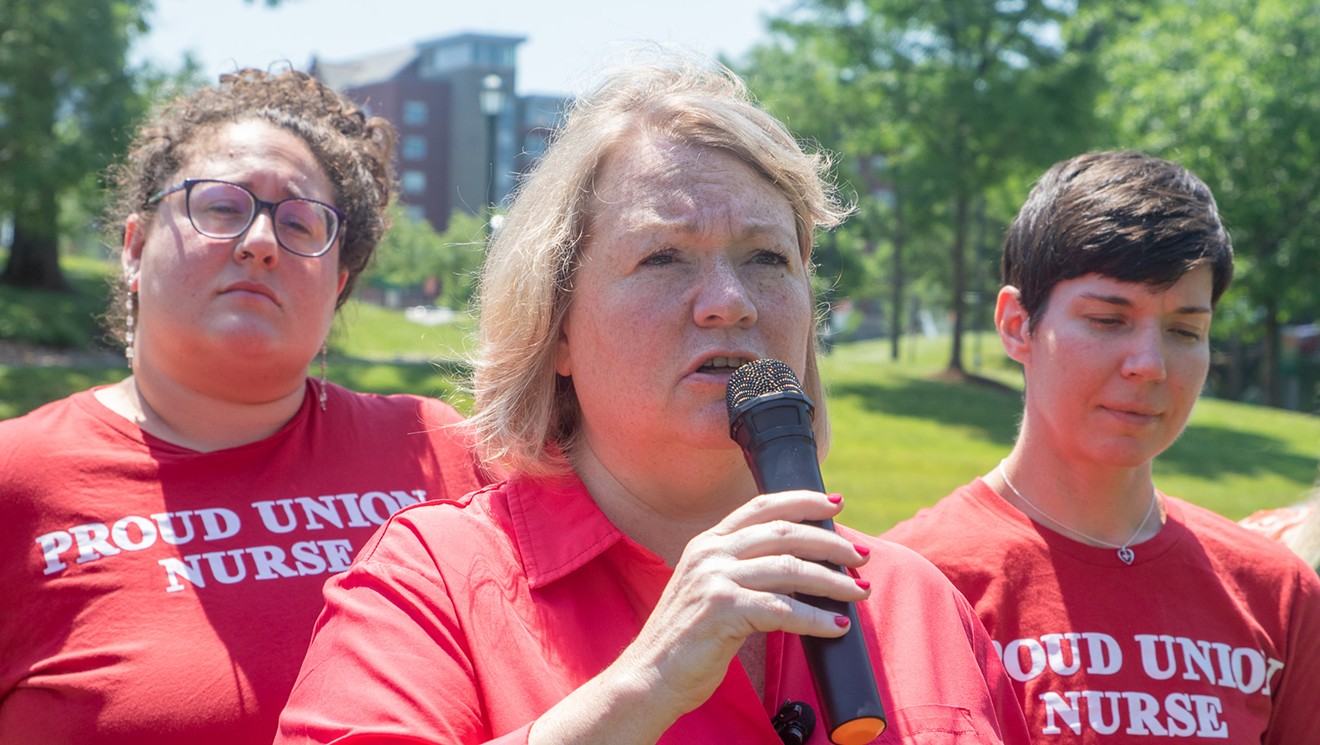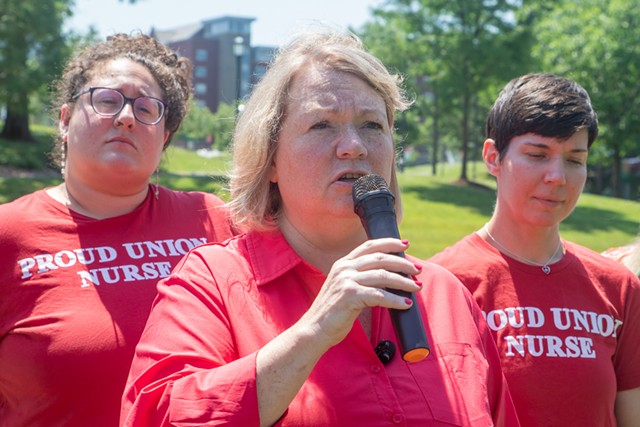UVM Medical Center nurses authorize strike as negotiations continue | Healthcare | Seven Days

Nurses at the University of Vermont Medical Center have voted to go on a five-day strike against the Burlington hospital if both sides fail to reach an agreement on a new contract in the coming days.
Eighty-five percent of members of the Vermont Federation of Nurses & Health Professionals supported the vote to authorize the strike, the union said at a press conference on Tuesday.
The vote gives the union the power to call a strike when its collective bargaining agreement expires on July 9, but it does not guarantee that a strike will occur. A federal mediator will join the negotiations this week, and both sides have indicated they are open to compromise.
“We know what we need to keep nurses here in Vermont … and we need the hospital to really listen to us,” said union president Deb Snell. “We know they can do better.”
The hospital is working to “improve and refine” its offering, President Stephen Leffler told reporters at a separate press conference Tuesday afternoon. “We have the same goal in mind and are committed to paying the best wages possible within all the constraints at our disposal.”
In months of negotiations over a new three-year contract, the two sides have not come any closer to agreeing on proposed wage increases.
The hospital has offered a 17 percent overall wage increase, which officials said would raise wages above the national average and allow the medical center to compete with similarly sized hospitals in the region.
The union has since proposed a 46 percent increase. It is also demanding that new steps be added to the contract to allow experienced nurses to continue receiving annual raises. About 500 nurses will have reached the top of the pay scale this fall, the union says, including some who started as recent graduates and are now in their 40s with another decade or two to spend in the profession.
Despite pay increases in recent years, many nurses in Chittenden County still struggle to make ends meet, Snell said. She pointed to a new report from Becker’s Hospital Review that found that the average nursing wage in Vermont, when adjusted for the cost of living, is about $37 an hour — nearly the lowest in the country.
When nurses move to better-paying jobs in other states, staffing shortages are exacerbated, and the hospital must spend heavily on temporary staff, Snell says. A $10,000 welcome bonus has helped recruitment efforts, but some leave the hospital after a year. They take on travel contracts themselves, Snell says, or “move to a state where they can make a living and raise a family.”
The threat of a strike is putting Vermont’s largest hospital in a tight spot just before the summer budget season. State regulators have called on the hospital to fix its access problems while cutting costs.
But nurses’ salaries make up 8 percent of the hospital’s overall budget, and so the union’s proposal would force the hospital to either cut services or raise insurance premiums for private clients, Leffler told reporters. He estimates those premium increases could be as much as 10 percent annually over the next three years, in addition to whatever else might be needed to keep operations running.
The hospital president addressed nurses directly last week in an effort to prevent what could be UVM’s second strike in the past decade, urging union members to vote against a stop-work strike and calling the two-day strike in 2018 a “very difficult time for our organization, our staff and our patients.”
It was also costly: The hospital paid $3 million to temporary workers over those two days. “Those were funds that could have been spent at the bargaining table, and after the strike, UVMMC’s proposal did not change significantly,” Leffler wrote.
Leffler told reporters the hospital is prepared to keep its doors open if nurses go on strike again. “We are very confident that we can provide high-quality, safe care over the five days, but I really hope that this kind of situation does not arise,” he said.
Whether the striking nurses will receive the same support this time remains to be seen: The cost-of-living increases cited by the union have also hit the general public hard over the past six years, and many say they are struggling to pay their health insurance premiums.
“Our message to them is that in the current economic climate, unfortunately, it is necessary to do just that to bring nurses to Vermont,” Snell said of the union’s proposal.
Although she hoped the strike threat would prove to be unfounded, Snell said she was convinced the union was in a better position today than it was in 2018, which is why a longer work stoppage was under discussion.
“We don’t think this two-day strike really made that much difference,” Snell said. “This time we are stronger. We are more committed. We know our worth. We know our value and we know they need us.”
“I’m retiring in a few years,” Snell continued. “I want to know that there’s someone who’s going to take over my job and take care of the patients when I’m gone.”




